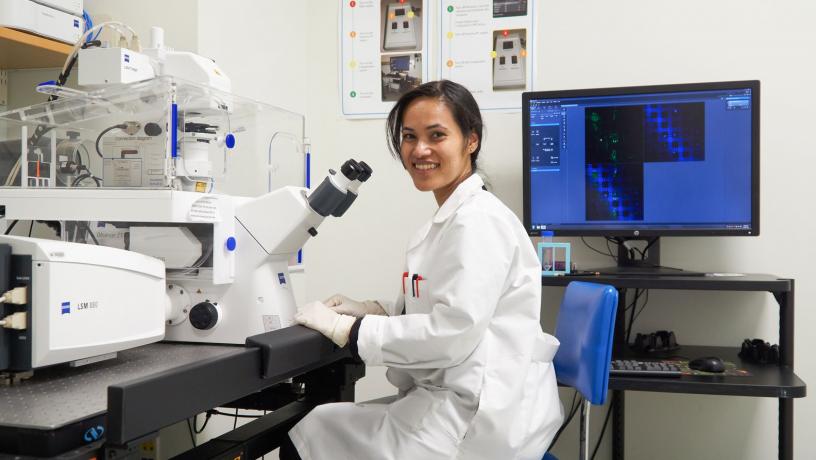Smiti Bhattacharya Receives Prestigious NIH Research Service Award
PhD candidate honored for her work on end-stage renal disease

Smiti Bhattacharya won the NIH Ruth L. Kirschstein National Research Service Award Predoctoral Individual Fellowship for her work on a novel nanotechnology platform.
Smiti Bhattacharya, a fifth-year doctoral candidate in mechanical engineering, has been awarded the prestigious National Institute of Health (NIH) Ruth L. Kirschstein National Research Service Award Predoctoral Individual Fellowship to support her research in the development of a novel nanotechnology platform as a tool for drug discovery for end stage renal disease.
End stage renal disease affects millions of Americans, and while manageable in its early phases through dialysis, the only treatment is kidney transplantation. Highly specialized kidney cells called podocytes have been implicated in numerous kidney diseases. However, because podocytes lose their intricate morphology in traditional cell culture, they are unsuitable to study in various disease models.
Working with professors James Hone, the Wang Fong-Jen Professor of Mechanical Engineering, and Evren Azeloglu, assistant professor at the Icahn School of Medicine at Mount Sinai (ISMMS), Bhattacharya is developing a 3D kidney-on-chip system that mechanically encourages the induction of this morphology. Using novel nanotechnology, the team is constructing a platform which better mimics the podocyte cell type in its native biological environment. This will enable systematic study of podocytes’ mechanobiology and drug response.
“We aim to use this platform to effectively identify small molecules which can protect the podocytes against toxic agents,” Bhattacharya says. “This will in turn translate to a screening system to predict adverse events caused by drugs and assist in the identification of therapeutics to offset these side effects.”
Bhattacharya began her doctoral research knowing that she wanted to complement her prior expertise in nanotechnology and bioengineering with research that could have the potential to be translated from benchtop to a practical application. “The joint research conducted by professors Hone and Azeloglu fit perfectly with my vision,” she says. “Professor Hone’s expertise in engineering and nanotechnology in synergy with the biological knowhow of Dr. Azeloglu have cumulatively strengthened my training in this diverse yet interdisciplinary line of research.”
The novelty in Bhattacharya’s research lies in enhancing the 3D biomimetic chip by introducing nonrigid in vivo-like substrate stiffness while preserving the unique interconnected surface architecture. “This unique platform will allow the study of podocyte biomechanics along with other biochemical characteristics simultaneously, all in a physiologically relevant microenvironment,” she explains. “The project is transformative in two ways: first by creating a new platform to study podocyte biology with greater physiological relevance and second by applying this system to test the biophysical effects of altered mechanobiological signaling that may affect the progression of chronic kidney disease at the cellular level.”
The Ruth L. Kirschstein National Research Service Award Individual Predoctoral Fellowship provides predoctoral individuals with supervised research training in a health-related area leading toward a research doctoral degree. “With this fellowship, I hope to strengthen my training in technical areas such as applied micro/nanofabrication and high-resolution imaging techniques,” says Bhattacharya. “In addition, through my time at ISMMS, I am working on building my knowledge and understanding of basic biology so as to be able to understand where I can use engineering as a tool to solve biological problems.”
“What excites me the most about conducting this research is the overarching bigger picture,” she adds. “To be able to be involved in building technology that may be used as a drug screening platform for end stage renal disease which can also possibly be used to predict adverse drug effects and subsequently identify the therapeutics to offset these side effects makes the research very meaningful.”
To be involved in building technology that may be used as a drug screening platform for end stage renal disease that can also possibly be used to predict adverse drug effects and subsequently identify the therapeutics to offset these side effects makes the research very meaningful.
